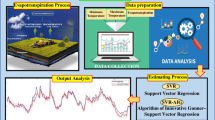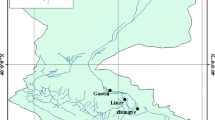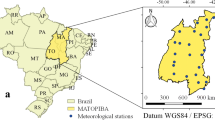Abstract
Reference evapotranspiration (ETo) is a critical water resource management parameter, including irrigation scheduling and crop water requirements. Because large uncertainties in estimating ETo can result in equally large uncertainties in determining water budgets and crop water requirements, and vice versa, accurate determination of ETo can be challenging when direct measurement and estimation with the Penman–Monteith (FAO-56-PM) semi-empirical equation of the food and agriculture organization (FAO) is not possible. Indeed, this study explores the use of the support vector regression machine learning algorithm (SVR) to predict daily ETo with limited measured inputs. It is the first time that Julian Day (J) is included as an input to improve prediction accuracy. Ten years of meteorological data collected at the Dar-El-Beidha weather station in Algeria are used, with maximum, minimum, and mean air temperatures (TM, tm, and T), mean relative humidity (RH), mean wind speed (u2), and sunshine duration (n) as inputs, as well as J and extraterrestrial solar radiation (Ra) as auxiliary variables, and the ETo-FAO-56-PM values as target outputs. Several SVR models are developed using different combinations of inputs, and their performance is assessed relative to ETo-FAO-56-PM values. Empirical equations are also used for comparison, and several evaluation metrics are employed, including root mean square error (RMSE), mean absolute percentage error (MAPE), determination coefficient (R2), RMSE-standard deviation ratio (RSR), Nash–Sutcliffe efficiency coefficient (NSE), and Willmott’s refined index (WI). The results show that the SVR models utilizing limited meteorological inputs in addition to J and/or Ra predicted ETo accurately and outperformed their corresponding estimates using empirical equations, radial basis function neural networks (RBFNN), and adaptive neuro-fuzzy inference systems (ANFIS) models obtained in previous studies. The RMSE ranged from 0.28 to 0.72 mm/day, R2 from 0.86 to 0.98, MAPE from 7 to 19%, RSR from 0.15 to 0.38, NSE from 0.86 to 0.98, and WI from 0.65 to 0.87. These findings could provide useful solutions for ETo estimation issues in areas with sparse data and agro-climatic conditions similar to those of Dar-El-Beidha.











Similar content being viewed by others
References
Aghelpour P, Mohammadi B, Biazar SM, Kisi O, Sourmirinezhad Z (2020) A theoretical approach for forecasting different types of drought simultaneously, using entropy theory and machine-learning methods. ISPRS Int J Geo-Inf 9(12):701. https://doi.org/10.3390/ijgi9120701
Agrawal Y, Kumar M, Ananthakrishnan S, Kumarapuram G (2022) Evapotranspiration modeling using different tree based ensembled machine learning algorithm. Water Resour Manag 36(3):1025–1042. https://doi.org/10.1007/s11269-022-03067-7
Allen RG, Pereira LS, Raes D, Smith M (1998) Crop evapotranspiration-Guidelines for computing crop water requirements-FAO Irrigation and drainage paper 56. Fao, Rome
Asadi A, Bakhtiyari AN, Alarifi IM (2021) Predictability evaluation of support vector regression methods for thermophysical properties, heat transfer performance, and pumping power estimation of MWCNT/ZnO–engine oil hybrid nanofluid. Eng Comput 37:3813–3823. https://doi.org/10.1007/s00366-020-01038-3
Celestin S, Qi F, Li R, Yu T, Cheng W (2020) Evaluation of 32 simple equations against the penman–monteith method to estimate the reference evapotranspiration in the hexi corridor, northwest china. Water (switzerland) 12(10):2772. https://doi.org/10.3390/w12102772
Chen D (2012) Daily reference evapotranspiration estimation based on least squares support vector machines. International conference on computer and computing technologies in agriculture. Springer, Berlin, pp 54–63
Cobaner M, Citakoǧlu H, Haktanir T, Kisi O (2017) Modifying Hargreaves-Samani equation with meteorological variables for estimation of reference evapotranspiration in Turkey. Hydrol Res 48(2):480–497. https://doi.org/10.2166/nh.2016.217
Cortes C, Vapnik V (1995) Support-vector networks. Mach Learn 20(3):273–297. https://doi.org/10.1023/A:1022627411411
Doorenbos J, Pruitt WO (1977) Crop water requirements. Land and Water Development Division, Rome
Elbeltagi A, Kushwaha NL, Rajput J, Vishwakarma DK, Kulimushi LC, Kumar M, Zhang J, Pande CB, Choudhari P, Meshram SG, Pandey K, Sihag P, Kumar N, Abd-Elaty I (2022) Modelling daily reference evapotranspiration based on stacking hybridization of ANN with meta-heuristic algorithms under diverse agro-climatic conditions. Stoch Environ Res Risk Assess 36(10):3311–3334. https://doi.org/10.1007/s00477-022-02196-0
Falamarzi Y, Palizdan N, Huang YF, Lee TS (2014) Estimating evapotranspiration from temperature and wind speed data using artificial and wavelet neural networks (WNNs). Agric Water Manag 140:26–36. https://doi.org/10.1016/j.agwat.2014.03.014
Ferreira LB, da Cunha FF, de Oliveira RA, Fernandes Filho EI, da Fernando FC, de Rubens AO, Elpidio IFF (2019) Estimation of reference evapotranspiration in Brazil with limited meteorological data using ANN and SVM – A new approach. J Hydrol 572:556–570. https://doi.org/10.1016/j.jhydrol.2019.03.028
Ferreira LB, da Cunha FF, Fernandes Filho EI (2022) Exploring machine learning and multi-task learning to estimate meteorological data and reference evapotranspiration across Brazil. Agric Water Manag 256:107281. https://doi.org/10.1016/j.agwat.2021.107281
Guan Y, Mohammadi B, Pham QB, Adarsh S, Balkhair KS, Rahman KU, Linh NTT, Tri DQ (2020) A novel approach for predicting daily pan evaporation in the coastal regions of Iran using support vector regression coupled with krill herd algorithm model. Theor Appl Climatol 142:349–367. https://doi.org/10.1007/s00704-020-03283-4
Hadadi F, Moazenzadeh R, Mohammadi B (2022) Estimation of actual evapotranspiration: A novel hybrid method based on remote sensing and artificial intelligence. J Hydrol 609:127774. https://doi.org/10.1016/j.jhydrol.2022.127774
Hargreaves GH, Samani ZA (1985) Reference crop evapotranspiration from temperature. Appl Eng Agric 1(2):96–99. https://doi.org/10.13031/2013.26773
Hassan MA, Khalil A, Kaseb S, Kassem MA (2017) Exploring the potential of tree-based ensemble methods in solar radiation modeling. Appl Energy 203:897–916. https://doi.org/10.1016/j.apenergy.2017.06.104
Huang G, Wu L, Ma X, Zhang W, Fan J, Yu X, Zeng W, Zhou H (2019) Evaluation of CatBoost method for prediction of reference evapotranspiration in humid regions. J Hydrol 574:1029–1041. https://doi.org/10.1016/j.jhydrol.2019.04.085
Jensen ME, Haise HR (1963) Estimating evapotranspiration from solar radiation. J Irrig Drain Div 89(4):15–41. https://doi.org/10.1061/jrcea4.0000287
Katipoğlu OM (2022) Prediction of missing temperature data using different machine learning methods. Arab J Geosci 15(1):21. https://doi.org/10.1007/s12517-021-09290-7
Kisi O (2013) Least squares support vector machine for modeling daily reference evapotranspiration. Irrig Sci 31(4):611–619. https://doi.org/10.1007/s00271-012-0336-2
Kisi O, Keshtegar B, Zounemat-Kermani M, Heddam S, Trung NT (2021). Modeling reference evapotranspiration using a novel regression-based method: radial basis M5 model tree. Theor Appl Climatol 145(1–2):639–659. https://doi.org/10.1007/s00704-021-03645-6
Kushwaha NL, Rajput J, Elbeltagi A, Elnaggar AY, Sena DR, Vishwakarma DK, Mani I, Hussein EE (2021) Data intelligence model and meta-heuristic algorithms-based pan evaporation modelling in two different agro-climatic zones: a case study from northern india. Atmosphere (basel) 12(12):1654. https://doi.org/10.3390/atmos12121654
Laaboudi A, Mouhouche B, Draoui B (2012) Neural network approach to reference evapotranspiration modeling from limited climatic data in arid regions. Int J Biometeorol 56(5):831–841. https://doi.org/10.1007/s00484-011-0485-7
Ladlani I, Houichi L, Djemili L, Heddam S, Belouz K (2012) Modeling daily reference evapotranspiration (ET 0) in the north of Algeria using generalized regression neural networks (GRNN) and radial basis function neural networks (RBFNN): a comparative study. Meteorol Atmos Phys 118(3–4):163–178. https://doi.org/10.1007/s00703-012-0205-9
Ladlani I, Houichi L, Djemili L, Heddam S, Belouz K (2014) Estimation of daily reference evapotranspiration (ET 0) in the North of Algeria using adaptive neuro-fuzzy inference system (ANFIS) and multiple linear regression (MLR) models: a comparative study. Arab J Sci Eng 39:5959–5969. https://doi.org/10.1007/s13369-014-1151-2
Langhammer J, Česák J (2016) Applicability of a nu-support vector regression model for the completion of missing data in hydrological time series. Water (switzerland) 8(12):560. https://doi.org/10.3390/w8120560
Mehdizadeh S, Behmanesh J, Khalili K (2017) Using MARS, SVM, GEP and empirical equations for estimation of monthly mean reference evapotranspiration. Comput Electron Agric 139:103–114. https://doi.org/10.1016/j.compag.2017.05.002
Mehdizadeh S, Mohammadi B, Pham QB, Duan Z (2021) Development of boosted machine learning models for estimating daily reference evapotranspiration and comparison with empirical approaches. Water (switzerland) 13(24):3489. https://doi.org/10.3390/w13243489
Mohammadi B, Safari MJS, Vazifehkhah S (2022) IHACRES, GR4J and MISD-based multi conceptual-machine learning approach for rainfall-runoff modeling. Sci Rep 12(1):1–21. https://doi.org/10.1038/s41598-022-16215-1
Moriasi DN, Arnold JG, Van Liew MW, Bingner RL, Harmel RD, Veith TL (2007) Model evaluation guidelines for systematic quantification of accuracy in watershed simulations. Trans ASABE 50(3):885–900
Oudin L (2004) Recherche d’un modèle d'évapotranspiration potentielle pertinent comme entrée d'un modèle pluie-débit global. ENGREF (AgroParisTech)
Patil AP, Deka PC (2016) An extreme learning machine approach for modeling evapotranspiration using extrinsic inputs. Comput Electron Agric 121:385–392. https://doi.org/10.1016/j.compag.2016.01.016
Ponraj AS, Vigneswaran T (2020) Daily evapotranspiration prediction using gradient boost regression model for irrigation planning. J Supercomput 76(8):5732–5744. https://doi.org/10.1007/s11227-019-02965-9
Priestley CHB, Taylor RJ (1972) On the assessment of surface heat flux and evaporation using large-scale parameters. Mon Weather Rev 100(2):81–92. https://doi.org/10.1175/1520-0493(1972)100%3c0081:otaosh%3e2.3.co;2
Raghavendra S, Deka PC (2014) Support vector machine applications in the field of hydrology: a review. Appl Soft Comput J 19:372–386. https://doi.org/10.1016/j.asoc.2014.02.002
Ruiming F, Shijie S (2020) Daily reference evapotranspiration prediction of Tieguanyin tea plants based on mathematical morphology clustering and improved generalized regression neural network. Agric Water Manag 236:106177. https://doi.org/10.1016/j.agwat.2020.106177
Salam R, Islam ARMT (2020) Potential of RT, bagging and RS ensemble learning algorithms for reference evapotranspiration prediction using climatic data-limited humid region in Bangladesh. J Hydrol 590:125241. https://doi.org/10.1016/j.jhydrol.2020.125241
Savva AP, Frenken K (2002) Crop water requirements and irrigation scheduling. FAO Sub-Regional Office for East and Southern Africa, Harare
Singh J, Knapp HV, Arnold JG, Demissie M (2005) Hydrological modeling of the Iroquois River watershed using HSPF and SWAT. J Am Water Resour Assoc 41(2):343–360. https://doi.org/10.1111/j.1752-1688.2005.tb03740.x
Smola AJ, Schölkopf B (2004) Statistics and computing—a tutorial on support vector regression.pdf. Stat Comput 14(3):199–222
StatSoft I (2011) Statistica version 10.0, data analysis software system. Tulsa: StatSoft
Tabari H, Kisi O, Ezani A, Hosseinzadeh Talaee P (2012) SVM, ANFIS, regression and climate based models for reference evapotranspiration modeling using limited climatic data in a semi-arid highland environment. J Hydrol 444–445:78–89. https://doi.org/10.1016/j.jhydrol.2012.04.007
Tang W, Li Y, Yu Y, Wang Z, Xu T, Chen J, Lin J, Li X (2020) Development of models predicting biodegradation rate rating with multiple linear regression and support vector machine algorithms. Chemosphere 253:126666. https://doi.org/10.1016/j.chemosphere.2020.126666
Vapnik VN (1995) The nature of statistical learning theory. Springer, New York
Wang S, Peng H, Hu Q, Jiang M (2022) Analysis of runoff generation driving factors based on hydrological model and interpretable machine learning method. J Hydrol Reg Stud 42:101139. https://doi.org/10.1016/j.ejrh.2022.101139
Yirga SA (2019) Modelling reference evapotranspiration for Megecha catchment by multiple linear regression. Model Earth Syst Environ 5(2):471–477. https://doi.org/10.1007/s40808-019-00574-2
Zhou Z, Zhao L, Lin A, Qin W, Lu Y, Li J, Zhong Y, He L (2020) Exploring the potential of deep factorization machine and various gradient boosting models in modeling daily reference evapotranspiration in China. Arab J Geosci 13:1287. https://doi.org/10.1007/s12517-020-06293-8
Zhu B, Feng Y, Gong D, Jiang S, Zhao L, Cui N (2020) Hybrid particle swarm optimization with extreme learning machine for daily reference evapotranspiration prediction from limited climatic data. Comput Electron Agric 173:105430. https://doi.org/10.1016/j.compag.2020.105430
Acknowledgements
The authors wish to thank and express their gratitude to the Meteorological National Office (ONM), Algiers, Algeria, for giving the authors access to the weather data of Dar-El-Beidha station.
Author information
Authors and Affiliations
Corresponding author
Ethics declarations
Conflict of interest
The authors have no relevant financial or non-financial interests to disclose. The authors have no competing interests to declare that are relevant to the content of this article. All authors certify that they have no affiliations with or involvement in any organization or entity with any financial interest or non-financial interest in the subject matter or materials discussed in this manuscript. The authors have no financial or proprietary interests in any material discussed in this article. The datasets generated during and/or analyzed during the current study are available from the corresponding author upon reasonable request.
Additional information
Edited by Dr. Ankit Garg (ASSOCIATE EDITOR) / Dr. Michael Nones (CO-EDITOR-IN-CHIEF).
Rights and permissions
Springer Nature or its licensor (e.g. a society or other partner) holds exclusive rights to this article under a publishing agreement with the author(s) or other rightsholder(s); author self-archiving of the accepted manuscript version of this article is solely governed by the terms of such publishing agreement and applicable law.
About this article
Cite this article
Zereg, S., Belouz, K. Modeling daily reference evapotranspiration using SVR machine learning algorithm with limited meteorological data in Dar-el-Beidha, Algeria. Acta Geophys. 72, 2009–2025 (2024). https://doi.org/10.1007/s11600-023-01107-3
Received:
Accepted:
Published:
Issue Date:
DOI: https://doi.org/10.1007/s11600-023-01107-3




